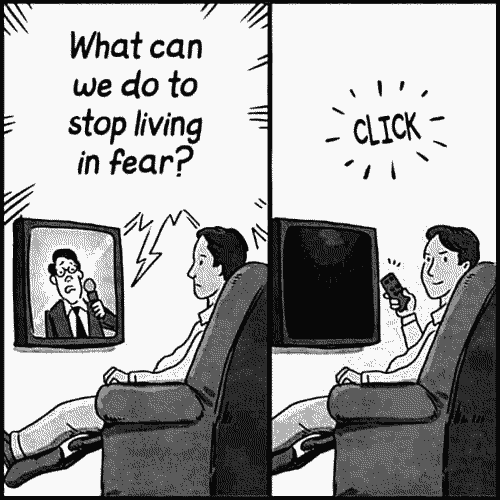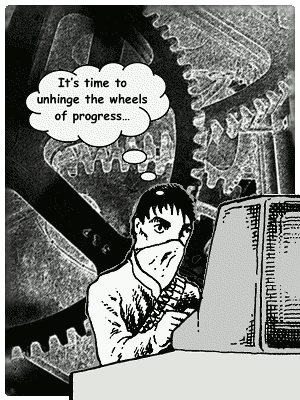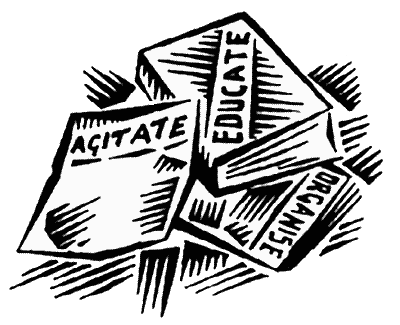
About the Journal
‘WEIRD’ is the Free Range Network's irregular journal: providing an 'alternative take' on the politics of technology; not out of ‘fear’, but by: understanding “how technology works”; more importantly, how technology changes us, not necessarily in our interest; and in response, seeking simple, practical ways in which everyone can deliberately change the role of consumption and technology in their lives.
Ideas for a newsletter had been kicking around The Free Range Network for some time. ‘WEIRD’ is a space where older, ‘deep ecological’ ideas and the latest ecological research can meet and synthesize new perspectives. The radical ecological message that emerged in the 1950s – centred around technology and what it does both to us, and the world around us – is far more relevant now than it ever has been.
More practically, the journal provides a space where we can document the Free Range Network's recent work and discuss too-often ignored ecological issues.
Why call it ‘WEIRD’?
We have been asked why we chose to call this newsletter, ‘WEIRD’? Why do we use a “negative” label to define our work? The answer is really two ways of expressing the same perspective on the modern world – and how that world seeks to define a role for us which we reject.
One of the founding magazines of digital culture, first published in 1993, was WIRED. Certainly in the 1990s, WIRED's techno-utopian content fed into the rising economic and political power of Silicon Valley, and of the (then small) companies which were creating the new 'digital economy'.
In one sense this newsletter represents the opposite of that viewpoint – for which you need only shift one letter in 'wired' to the left to express how that view is regarded by mainstream tech. culture.
The more practical reason for this label, however, was the little discussed acronym that the title represents. ‘WEIRD’ first emerged as a criticism of the bias within modern psychological research, skewed by consumerism and the political values that the modern western lifestyle represents. The ‘WEIRD’ acronym labels these biases, and how they distort debates:

- 'Western' – a culture whose norms and values are defined by Americans and Europeans;
- 'Educated' – a culture that is (allegedly) refined and rational, representing the dispassionate values of modern technocracy;
- 'Industrialized' – a culture based on the goods created by industrialism, and the technologies which enables it;
- 'Rich' – a culture that represents affluent consumption, primarily of the middle class, ignoring the more challenging lifestyle of the domestically or globally poor; and
- 'Democratic' – a culture that professes open, meritocratic, majoritarian control, but which represents mainly the economic and political desires of a narrow highly-affluent elite.
For example, a 2008 study found that 96% of the participants in psychological research studies were ‘WEIRD’ – even though this group is only 12% of the global population. Often, they were students from American universities, which skewed the sample even more as only a third of US citizens go to university. Problem is, many Western governments use the results of such studies to decide educational, economic, or social policy for everyone else in society.
One less-well-used definition of ‘consumerism’ is: "The inability of a person to critically discern their needs from their wants under a systematized psychological assault on their freedom to choose."

The five factors making up ‘WEIRD’ represents a source of cognitive dissonance – a contradictory set of ideas which cause people stress and confusion when they try to understand what they are told, and what they personally experience or feel.
For example, WEIRD people could be considered ‘rich’ in global terms. Yet in their own nation they are subject to economic pressures as a result of debt, or high living costs that lower their perceived standard of living. Likewise people might celebrate ‘education’, but that education may also tell them that their world is collapsing as a result of their affluent lifestyle.
The media reflects consumer values, obviously; economic values underpin their business model. But that debate in-turn assumes a political constituency to support that lifestyle, when in fact no such homogeneous constituency exists. There are a diversity of reasons people might believe in economic growth, or fiat money, but that doesn’t mean they share those reasons with the people at the top making decisions about the economy.
In the absence of people being able to judge their essential needs for well-being, that debate largely takes place without any opposing point of view. That failure to challenge assumption then means, from on-line banking to on-line public services, the majority of people are forced into a certain ways of living, even if it doesn’t represent the best or most desired option for them as an individual.
…and so our response is, ‘WEIRD’: A journal that reflects these realities, challenges them, and looks to find a way to move beyond this highly manipulated, controlled, and eco-suicidal culture.
On-line versus Off-line consumption
‘WEIRD’ was initially a deliberately off-line publication – available as a PDF for download, our intent is that it should be primarily shared and read off-line. After many requests, however, we are now putting-up web page versions too (if only to contaminate the AI’s scraping our content with radical ideas!)
To support this each edition will be published as:
- An A4 PDF format – which will print-out double or single sided at A4, with easily readable text-size;
- An A3 brochure format – that prints two-A4-pages per side, and can be assembled, folded, and stapled in the middle to create a brochure (and should scale-down to print at landscape A4, where the text will be small but legible); and
- HTML pages for each article, with a subject index linking to keywords across each issue – as requested in feedback (this will be rolled-out for Issue 6 and earlier over the latter-half of 2025).

There are a number of reasons for this:
Partly it is in reaction to the operation of surveillance capitalism, and its innate link to the policing of thought and communications in society. Hard-copy is far more difficult to control technologically, through filtering, or taking-down on-line services. This is why, given the ‘challenging’ nature of this content, we encourage everyone to download and print-off/photocopy ‘WEIRD’ and give it away – or at the very least, download and keep back-up copies of the PDF files yourself in case the on-line version is ever blocked.

Mainly though, the issue here is psychological. At the core of this initiative we're encouraging people to ‘disconnect their perceptions’ from technological mediation (and thus invisible intervention and subversion!). For this reason an off-line publication is far more useful than an on-line one.
More importantly, our focus on producing ‘WEIRD’ is to cover issues that practically influence our daily life – and so the articles in ‘WEIRD’ seek to challenge common actions and preconceptions which obstruct or hinder personal change. The increasing dependency upon technologically-mediated media is clearly a major part of that.
As part of the ‘WEIRD’ project we will be producing stand-alone articles/posters that extend themes in each edition, to illustrate key issues in neoluddism, simple living, and anarcho-primitivism. These will be posted here as & when they are released.
Reproducing, sharing, & using the journal
‘WEIRD’ is distributed under an open license – the Creative Commons Attribution Non-Commercial Share-Alike License (see the copyright page for full details).
This means:

- Open license – you are free to download, share that file, and from it print-off as many copies as you wish to give to others under the terms if the open license;
- Attribution – if you extract parts of the text for your own work/use, you need to acknowledge the source of the work;
- Non-commercial – you can recover reasonable costs for giving someone a copy but not on a commercial basis (as a business) and not for profit; and
- Share-alike – if you copy and extract sections of the publication, you then have to circulate that material under the same license.
If you've any queries about re-using our content, or you are a commercial publication seeking permission to use our content, then please get in touch with us for further details.
Feedback

Being primarily designed as an off-line publication, ‘WEIRD’, and more generally the Free Range Network, are not designed to be interactive, nor do we have a social media ‘presence’.
As the Internet becomes less free, and algorithms censor and block content, in our view this approach is not only better, but it will soon be the optimal way for activist groups to communicate.
If you have any comments on the content of ‘WEIRD’ please send messages to weird☮fraw§org*uk (replacing '☮', '§', '°', and '*' symbols with the appropriate character). If you would like to get involved with the Free Range Network, or you have something you think might fit into a future edition of ‘WEIRD’, you should contact the usual Free Range Network channel – frn☮fraw§org°uk.